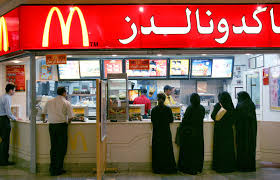The Little Gym USA Signs Master Franchise Agreement For Middle East
19 Jan 2010 - The Little Gym International, franchisor of gyms providing curriculum-based, non-competitive motor skills development programs to children aged 4 months to 12 years old, has entered into a master franchise agreement with an existing franchise owner in Kuwait City, Kuwait, to develop at least 15 and as many as 50 locations in the Middle East over the next decade.
Husband-and-wife team Adel Al-Bader and Khaldah Al-Ghanim, who opened their first The Little Gym in Kuwait City in 2003, will continue operating that location and developing more sites throughout Kuwait. In addition, they will now seek prospective single- and multi-unit franchise owners to develop The Little Gym locations in the United Arab Emirates, Saudi Arabia, Lebanon, Egypt, Bahrain, Syria, Oman, Qatar, Iran, Cyprus, Jordan, Morocco, Algeria, Mauritania, Tunisia, Libya, Sudan, Iraq and Yemen. They will also assist those who join the franchise in opening and operating their locations, providing business training, site-selection and site-design assistance, operational consulting, market adaptation, marketing support, translation assistance and other ongoing services, with support from The Little Gym International.
Both individuals have significant business and franchising experience. Mr. Al-Bader has a degree in Business Administration and worked in human resources for Kuwait Airways for 14 years and was a branch manager for Quality Tools Franchised Co., a SNAP-ON franchisee, for five years. His wife, Khaldah Al-Ghanim, has a degree in English Literature and taught English at Kuwait University until 2000. Both have been full-time franchisees since joining The Little Gym in 2001.
The Little Gym currently has 301 locations in 19 countries worldwide, including 261 in the United States. Widely recognized as the leading developer of motor skills in young children, the chain was recently named #1 in the children's fitness category for the second consecutive year by Entrepreneur (January 2008), capping off a year of milestones and accolades that included being named a "Hot Retailer" by the International Council of Shopping Centers (ICSC) and one of Inc. magazine's 5,000 fastest-growing private companies in the United States (September 2007). The company also recently opened its 250th U.S. location, 300th worldwide gym and first site in Manhattan.
With a presence in Asia for the past 13 years and a solid foundation throughout Europe, The Little Gym now has a strategic vehicle in place to expand in another key region of the international market, according to Vice President of Franchise Development Ruk Adams.
"This is a very significant development for us on the international stage," said Adams. "It places an experienced entity with a vested interest in growth and a proven success in our system in the Middle East to oversee the selection, recruitment, inauguration and ongoing support of additional franchise owners there, and will allow our development efforts to move forward with full force. In fact, we have already contacted some 20 prospects who previously expressed interest in The Little Gym in Saudi Arabia, Dubai/United Arab Emirates, Jordan, Oman and Cyprus, and we plan to meet with some of them early in 2008."
The Little Gym faces a warm reception throughout the region, said Ms. Al-Ghanim. "The Little Gym is unique in its structure, use of music, individual focus on each child, and the way its themes and fun lead to increased self-esteem. Parents in Kuwait believe in The Little Gym because they noticed a difference in their children, and we're confident that feeling will spread to other locations as we fulfill our development agreement," she said.
The Little Gym Franchise is yet to expand in the Indian subcontinent. Childcare Franchising is on the rise in India, which began initially with preschools like Bachpan and many others.


 NEW DELHI: RJ Corp, the diversified conglomerate owned by serial entrepreneur Ravi Jaipuria, is about to clinch a deal that will in one stroke hand it all of PepsiCo's bottling operations in Sri Lanka and expand its global footprint further.
NEW DELHI: RJ Corp, the diversified conglomerate owned by serial entrepreneur Ravi Jaipuria, is about to clinch a deal that will in one stroke hand it all of PepsiCo's bottling operations in Sri Lanka and expand its global footprint further.
